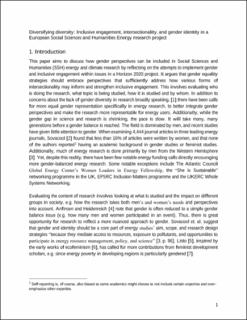| dc.contributor.author | Søraa, Roger Andre | |
| dc.contributor.author | Anfinsen, Martin | |
| dc.contributor.author | Foulds, Chris | |
| dc.contributor.author | Korsnes, Marius | |
| dc.contributor.author | Lagesen, Vivian Anette | |
| dc.contributor.author | Robinson, Rosie | |
| dc.contributor.author | Ryghaug, Marianne | |
| dc.date.accessioned | 2021-03-01T10:06:38Z | |
| dc.date.available | 2021-03-01T10:06:38Z | |
| dc.date.created | 2019-12-02T14:44:56Z | |
| dc.date.issued | 2020 | |
| dc.identifier.issn | 2214-6296 | |
| dc.identifier.uri | https://hdl.handle.net/11250/2730868 | |
| dc.description.abstract | This paper argues for inclusive engagement within Social Sciences and Humanities (SSH) interdisciplinary research, particularly, energy and climate research, by reflecting on the attempts to implement an inclusive engagement approach in SHAPE ENERGY, a Horizon 2020 project aimed at creating a European energy-SSH platform where a broad range of viewpoints from researchers, businesses, policymakers, NGOs, and citizens could be brought to bear on energy policy discussions. The European Horizon 2020 funding program has sought to explicitly integrate gender considerations into their funded projects, including SHAPE ENERGY. Our study shows that, in spite of such ambitions, there was huge variety with regard to how gender was understood as well as how notions of gender were engaged with during the project. Dealing with gender was often reduced to counting men and women, while wider concerns, such as representations of age, geography, field of expertise, etc., were comparatively neglected. In this paper, we argue that gender equality strategies should embrace these wider perspectives to sufficiently address how various forms of intersectionality may inform and strengthen inclusive engagement. | en_US |
| dc.language.iso | eng | en_US |
| dc.publisher | Elsevier | en_US |
| dc.rights | Attribution-NonCommercial-NoDerivatives 4.0 Internasjonal | * |
| dc.rights.uri | http://creativecommons.org/licenses/by-nc-nd/4.0/deed.no | * |
| dc.title | Diversifying diversity: Inclusive engagement, intersectionality, and gender identity in a European Social Sciences and Humanities Energy research project | en_US |
| dc.type | Journal article | en_US |
| dc.type | Peer reviewed | en_US |
| dc.description.version | acceptedVersion | en_US |
| dc.source.volume | 62 | en_US |
| dc.source.journal | Energy Research & Social Science | en_US |
| dc.identifier.doi | https://doi.org/10.1016/j.erss.2019.101380 | |
| dc.identifier.cristin | 1755521 | |
| dc.relation.project | Norges forskningsråd: 296205 | en_US |
| dc.description.localcode | Embargo applies until April 1, 2022 CC BY-NC-ND | en_US |
| cristin.ispublished | true | |
| cristin.fulltext | postprint | |
| cristin.fulltext | postprint | |
| cristin.qualitycode | 1 | |

